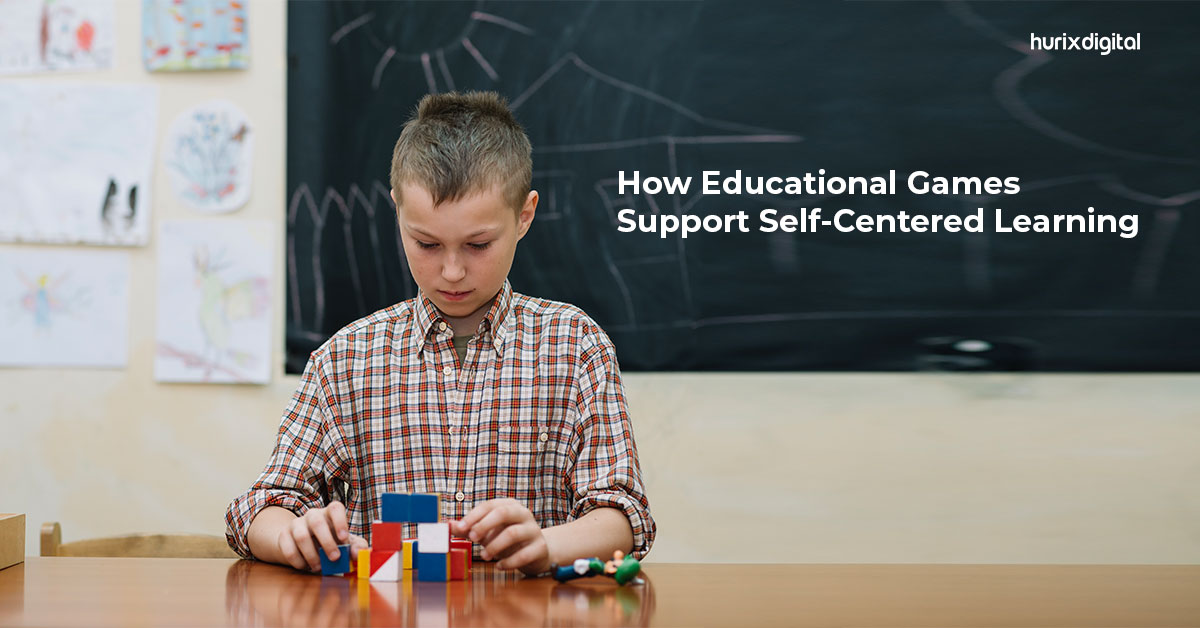How Educational Games Support Self-Centered Learning
Educational video games have emerged as a powerful and effective tool to support self-centered learning, fostering independent and personalized learning experiences for K12 students of all ages. By blending game-based learning in the classroom with traditional educational instruction, educational video games enable learners to take control of their learning journey, tailoring it to their unique needs, pace, and preferences. Here is what you need to know how interactive learning games support self-centered learning and the various benefits they offer learners.
Table of Contents:
- Essential Features of Self-Centered Learning
- 7 Benefits of Self-Centered Learning
- How Educational Video Games Support Self-Centered Learning
- Hurix & Game Learning: Educational Video Games to Support Self-Centered Learning
Essential Features of Self-Centered Learning
Self-centered learning, also called self-directed learning or self-regulated learning, is an educational approach that places the responsibility of learning on the student. In this approach, students actively set their learning goals, plan their study, and evaluate their progress. The focus is empowering students to become independent, motivated, and lifelong learners.
Traditional education often relies on a teacher-centered model, where educators plan and execute the curriculum, pace, and assessment methods. However, self-centered learning recognizes students’ unique interests, preferences, and learning styles. By allowing students to take charge of their educational journey, self-centered learning fosters a deeper understanding of the subject matter and helps develop critical thinking and problem-solving skills.
One of the fundamental principles of self-centered learning is autonomy. Students can choose what, when, and how they learn. They can select topics that align with their interests and aspirations, creating a more engaging and enjoyable learning experience. Additionally, students can determine their learning pace, ensuring that they grasp concepts thoroughly before moving on to more complex subjects.
A second aspect of self-centered learning is the development of metacognitive skills. Metacognition refers to the ability to reflect on one’s learning processes and adapt strategies accordingly. In a self-centered learning environment, students regularly assess their understanding, identify areas that need improvement, and adjust their learning approaches to achieve better results.
Self-centered learning does not require a lack of structure or reduced guidance. Instead, it offers a balance between freedom and support. Educators and mentors play crucial roles in this approach, providing guidance, resources, and constructive feedback. They act as facilitators, helping students navigate their learning journeys and offering assistance when needed.
Technology has significantly enhanced self-centered learning via gamification in education. Educational video games, online game-based learning, and game-based activities enable students to access vast information and engage in dynamic learning experiences. Educational games often incorporate quizzes, forums, and progress tracking, empowering learners to monitor their growth effectively.
7 Benefits of Self-Centered Learning
Here are 7 benefits associated with a self-centered learning approach.
1. Adaptability
Students develop the ability to adapt their learning strategies to suit different subjects and challenges.
2. Engagement
When students actively participate in their education, they are more engaged and committed to achieving their goals.
3. Enhanced retention
Ownership of the learning process leads to better retention and understanding of the material.
4. Increased motivation
Students are more motivated when they have control over their learning experience and can explore topics of personal interest.
5. Lifelong learning
Self-centered learning equips students with the skills to become independent learners throughout their lives.
6. Personal growth
Self-centered learning fosters critical thinking, problem-solving, and time management skills, promoting personal growth and development.
7. Self-awareness
Students can gain valuable insight into their strengths and weaknesses, helping them make informed decisions about their educational and career paths.
Despite these benefits, self-centered learning also presents challenges. Some students may need help managing their time or more self-discipline required for independent learning. Moreover, certain subjects might require more structured instruction, making a balance between self-centered and teacher-centered approaches essential.
Also Read: Customized Learning Experiences: Personalizing Education with Educational Video Games in K12
How Educational Video Games Support Self-Centered Learning
Educational video games offer support for self-centered learning in several ways. One crucial aspect of self-centered learning supported by educational video games is immediate feedback. Most interactive learning games provide prompt responses to players’ actions, allowing them to see the consequences of their decisions. Positive reinforcement for correct answers and constructive feedback for mistakes encourage students to experiment, take risks, and learn from their errors without fearing judgment. This iterative process enhances learning retention and boosts self-confidence, as players can witness their progress firsthand.
Furthermore, game-based learning in education caters to individual learning styles and preferences. All students have unique strengths and weaknesses when it comes to absorbing information. Interactive learning games offer diverse approaches to presenting content, including visuals, audio, text, and interactive elements. Players can choose the mode of information delivery that resonates best with them, optimizing their comprehension and knowledge retention.
The adaptability of educational video games and online game-based learning is another crucial feature supporting self-centered learning. Many educational games use adaptive learning algorithms that adjust the difficulty and content based on the player’s performance and progress. This ensures that students are consistently challenged appropriately, preventing frustration from tasks that are too difficult or boredom from tasks that are too easy. As students become more proficient, many educational video games evolve accordingly, providing a continuous and personalized learning experience.
Gamification in education elements, such as points, rewards, and achievements, also contributes to self-centered learning. These game-based activities create a sense of accomplishment and intrinsic motivation for students to excel and progress. By setting personal goals and monitoring their achievements, students become more self-aware and develop a growth mindset, viewing challenges as opportunities for growth rather than obstacles.
Moreover, educational video games facilitate self-paced learning. In traditional classroom settings, instructors follow a fixed timetable, leaving little room for individual preferences and learning speeds. In contrast, educational games and online game-based learning allow students to pause, rewind, and replay content as needed, providing ample time for comprehension and mastery. This flexibility accommodates different learning paces, ensuring no one is left behind or rushed through the material.
Collaborative features in educational video games also promote self-centered learning by encouraging peer interaction and cooperation. Many interactive learning games offer multiplayer options where learners can collaborate, compete, and share knowledge. Such social interactions foster communication skills, teamwork, and exchanging ideas, enhancing the learning experience.
Also Read: Top 4 Common Challenges of Using Educational Video Games in the Classroom
Hurix & Game Learning: Educational Video Games to Support Self-Centered Learning
Game Learning, a leading EdTech company, has partnered with Hurix Digital, one of the world’s leading digital curriculum providers to offer educational video games for the K12 curriculum. To learn more, or to request a free demo, contact Hurix Digital today.

Matt Massman is the Founder and CEO of Game Learning, a leading EdTech company based in Los Angeles. Massman has spent his career developing educational tools to improve the way students learn. Previously, he launched Vinci Academy with Dr. Dan Yang. As Founder and CEO of Mass Equity, a privately held real estate development company, he has facilitated more than $1 Billion in developing preK-12 educational facilities.









